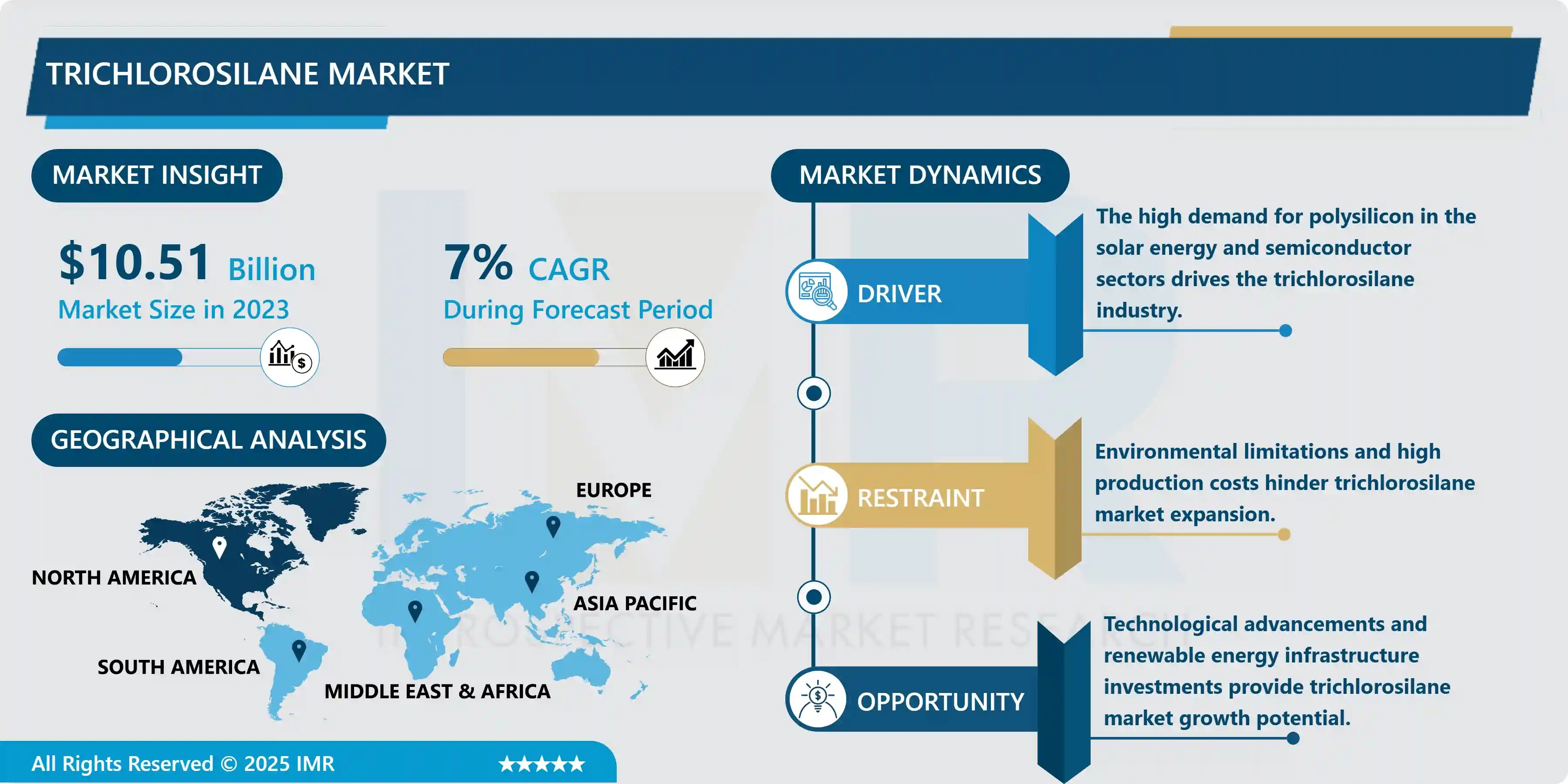Trichlorosilane Market Forecast: $18.07 Billion Value Predicted by 2032

Introspective Market Research (IMR) today published its in-depth Trichlorosilane Market Report, projecting robust growth in the global trichlorosilane (TCS) sector. IMR’s analysis estimates the market — valued at USD 10.51 billion in 2023 — will expand to USD 18.07 billion by 2032, with a compound annual growth rate (CAGR) of ~7.0% between 2024 and 2032.
This surge is being driven by accelerating demand for polysilicon in solar photovoltaics and semiconductor applications, amid broader growth in the silicones sector. Trichlorosilane is a crucial intermediate in producing ultra-pure silicon, making it indispensable in high-growth clean energy and electronics value chains. Meanwhile, technology improvements and capacity expansions are helping manufacturers scale both hydrochlorination and direct chlorination production routes.
Quick Insights (IMR Analysis)
· 2023 Market Size: USD 10.51 billion
· 2032 Forecast: USD 18.07 billion
· CAGR (2024–2032): ~ 7.0%
· Production Processes Covered: Hydrochlorination; Direct Chlorination
· Primary Applications: Silane Coupling Agent; Polycrystalline Silicon (polysilicon)
· Key Region: Asia-Pacific — driven by solar and semiconductor capacity build-out
· Major Players: Evonik, Wacker Chemie, Momentive, Shin-Etsu, Dow, 3M, and others
What Opportunities & Trends Are Emerging?
Could the solar boom continue to turbocharge trichlorosilane demand?
Yes — as countries scale up clean-energy targets, demand for high-purity polysilicon will remain strong, and TCS is a critical precursor in that value chain.
Is vertical integration by silicon manufacturers reshaping the landscape?
Absolutely. Several producers are investing upstream into TCS production and downstream into wafer manufacturing to gain tighter control over supply chains.
Will environmental regulations challenge traditional production?
Potentially. The hydrochlorination route has emissions concerns, pushing the industry to adopt cleaner technologies and invest in abatement to comply with rising environmental standards.
Expert Commentary
“Trichlorosilane is no longer a niche chemical — it's becoming central to the clean-energy and semiconductor revolution,” said Dr. Arun Mehta, Principal Consultant at Introspective Market Research.
“With solar installations scaling globally and the demand for ultrapure silicon rising, companies that can secure high-purity TCS production and optimize their processes will be best positioned for long-term growth.”
Regional & Segment Analysis
· Asia-Pacific: The fastest-growing region, anchored by China, Japan, India, and South Korea. Flagship solar manufacturing hubs and expanding semiconductor fabs are fueling TCS demand.
· North America: High consumption in polysilicon production, driven by large-scale solar projects and technological innovation.
· Europe: Silicon-specialty and coupling-agent applications are growing, backed by robust R&D and regulatory support for high-performance materials.
· Middle East & Africa / South America: Emerging demand from downstream silicones and PV manufacturing.
By Production Process, IMR expects hydrochlorination-based TCS to remain dominant, but direct chlorination is gaining favor as a potentially lower-emissions route.
By Application, polycrystalline silicon remains the largest end-use, while silane coupling agents continue to support demand in adhesives, sealants, and specialty silicones.
Breakthroughs & Innovations from Key Players
· Wacker Chemie AG is expanding its TCS capacity to support its integrated polysilicon business.
· Shin-Etsu Chemical is investing in advanced purification methods to produce ultra-high purity TCS for semiconductor-grade silicon.
· Momentive has announced R&D into lower-carbon TCS production, aiming to reduce environmental footprint.
· Evonik Industries continues to leverage TCS for specialty silanes and high-performance silicones used in coupling agents and adhesives.
Challenges & Cost Pressures
· High Energy Consumption: TCS production (especially via chlorination) is energy-intensive, raising cost pressures.
· Environmental and Safety Regulations: Chlorosilane handling and emissions are tightly regulated, increasing compliance costs.
· Feedstock Risk: Availability and cost of silicon and chlorine sources can fluctuate, affecting margin stability.
· Capital Intensity: Building or upgrading TCS production facilities requires significant investments.
Case Study (Illustrative)
A major polysilicon manufacturer in China invested in a backward-integrated TCS plant to secure its supply chain. Over 24 months:
· Reduced feedstock cost volatility by 15%
· Increased wafer production reliability, thanks to better control over precursor quality
· Improved environmental compliance, by investing in emission control for its TCS unit
· Downstream margin improvement, as self-supply of TCS helped optimize silicon production costs
This illustrates how vertical integration in the TCS value chain can deliver both economic and strategic benefits.
Why This Report Matters
IMR’s Trichlorosilane Market Report is essential for:
· Silicon and polysilicon manufacturers planning upstream integration
· Specialty chemical companies serving the silanes space
· Renewable energy firms optimizing supply chains for solar-grade materials
· Semiconductor companies needing high-purity intermediates
· Investors seeking clarity on long-term chemical demand in clean-tech markets
The report provides:
✔ Forecasts by process, application & region
✔ Competitive landscape of major TCS producers
✔ Technology and sustainability roadmap
✔ Strategic recommendations for scaling and investment
Call to Action
· Detailed demand forecasts by geography and process
· Capital strategy for TCS production or expansion
· Technology pathways to reduce emissions and improve yield
· Competitive positioning and partnership opportunities
👉 Request Your Sample / Book a Consultation
About Introspective Market Research
Introspective Market Research (IMR) is a global strategic intelligence firm specializing in innovation-led, high-growth sectors — including advanced materials, chemicals, clean energy, and sustainability. IMR’s multidisciplinary team of analysts, scientists, and strategists delivers rigorous forecasts, actionable insights, and future-ready strategies to empower business leaders, investors, and policymakers.
Contact:
Introspective Market Research
📞 +1-773-382-1047
📧 sales@introspectivemarketresearch.com
🌐 www.introspectivemarketresearch.com
- Art
- Causes
- Crafts
- Dance
- Drinks
- Film
- Fitness
- Food
- Oyunlar
- Gardening
- Health
- Home
- Literature
- Music
- Networking
- Other
- Party
- Religion
- Shopping
- Sports
- Theater
- Wellness


